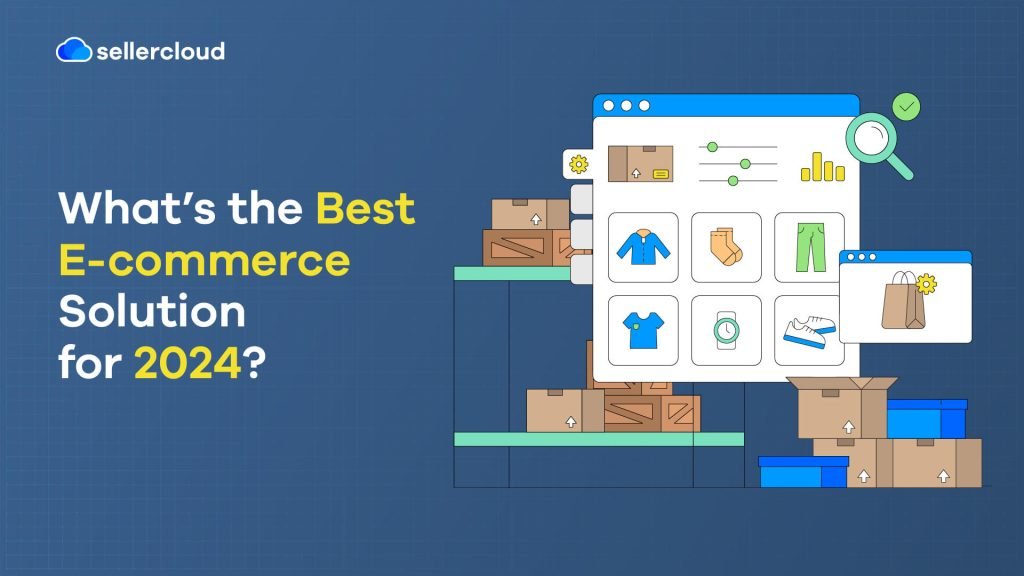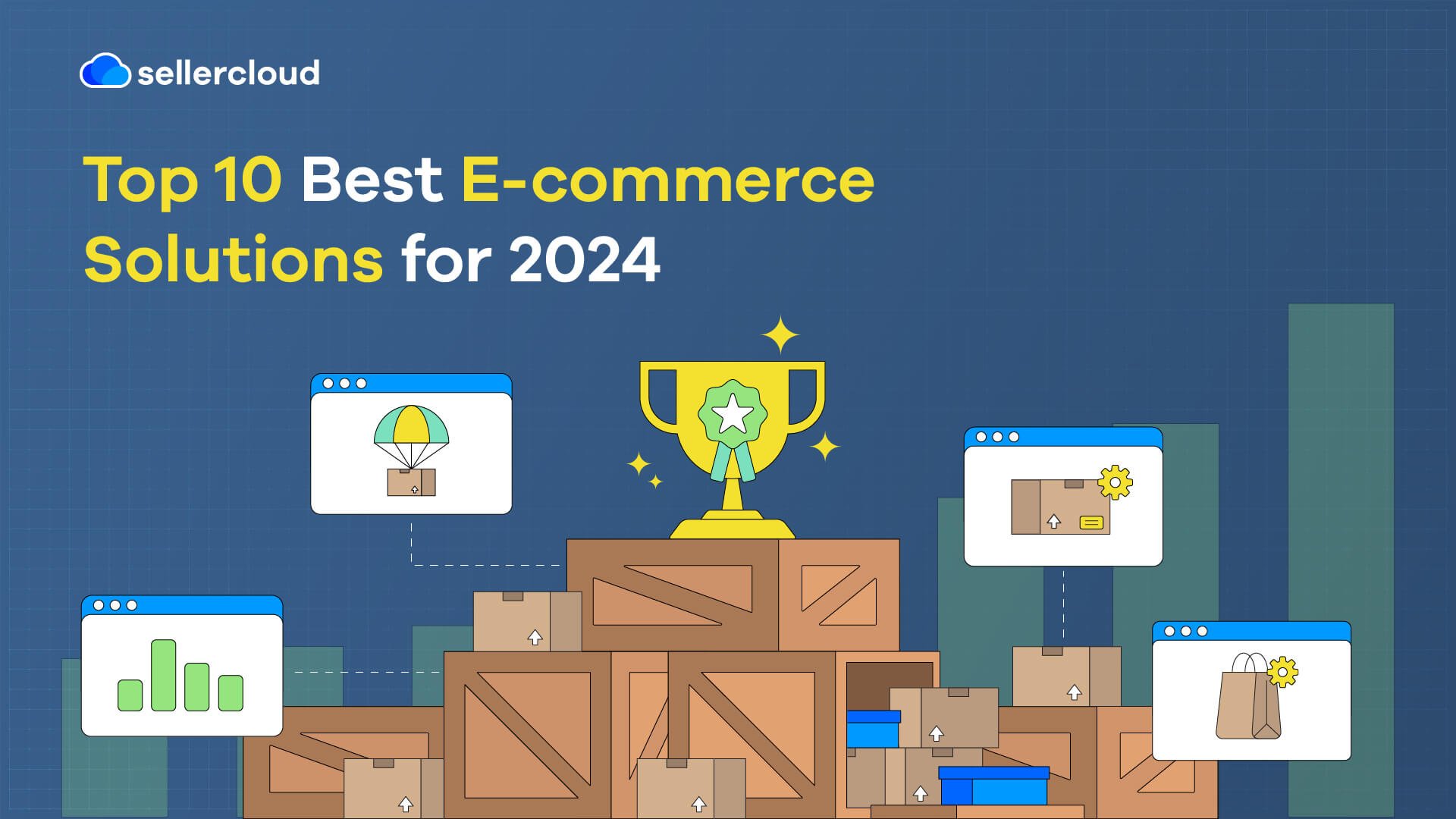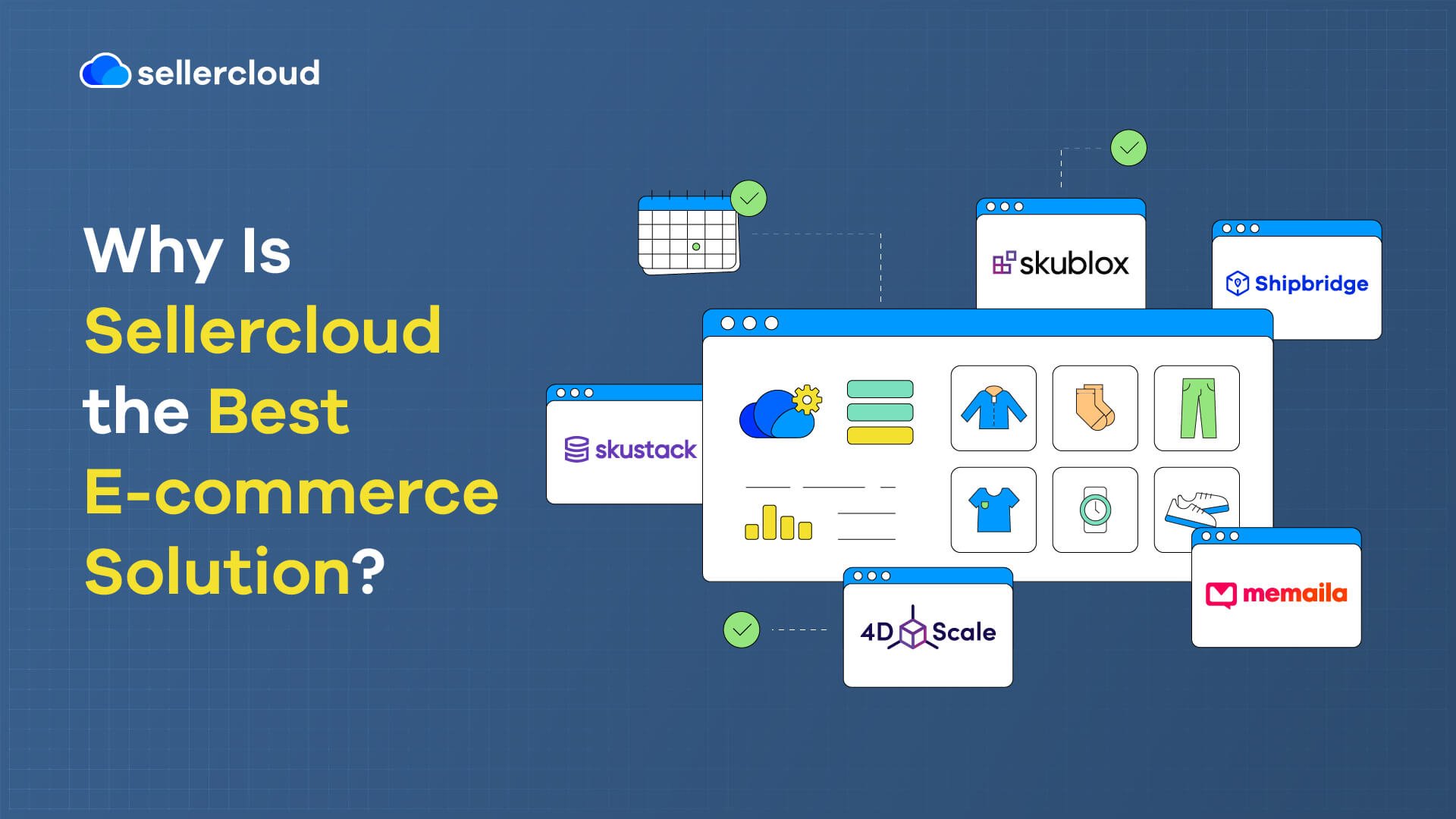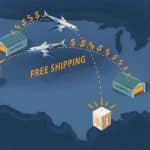
- Ecommerce companies use multiple ecommerce solutions to support their business, but not all are created equal.
- Sellercloud is an omnichannel growth platform designed to handle all ecommerce tasks and centralize any additional services customers may need.
According to data from Statista, the ecommerce software application market was estimated to be worth approximately $7.4 billion in 2023, and experts strongly believe that it will continue to grow.
Ecommerce software solutions help businesses reach customers, fulfill orders, handle their finances, manage product listings across the web, and much more.
However, some solutions fulfill more needs than others and are more cost-effective.
In this article, we’ll run through the top ecommerce solutions for 2024 so you can choose the best solution for your business.
The Top 10 Best Ecommerce Solutions for 2024

Many businesses start with pen and paper and spreadsheets without any ecommerce software.
It can work that way in the beginning. However, as a business grows, orders become more extensive and complex, and doing it all manually is impossible.
What you might deem ‘the best ecommerce solution’ is entirely based on your needs. What works for one business may not work for another, so you must first understand what you need an ecommerce solution for your business.
Where do your current operations fall short? Are there any gaps in your everyday operations?
The ecommerce market is highly competitive, and many companies offer similar services, so choosing the right one is challenging.
Furthermore, you need to consider costs, which can range wildly.
For example, ERP (Enterprise Resource Planning) software can be very powerful but enormously expensive. It has a plethora of manufacturing features you might never use and an unnecessary level of complexity.
Then, some companies do little more than their rivals but charge significantly more without a clear justification.
So, how do you separate the good from the bad? The advanced from the primitive? The expensive from the cost-effective?
It’s a lot to research. That’s why we’ve shortlisted our top 10 ecommerce software solutions for 2024. Let’s get started.
1. Sellercloud
Founded in 2010, Sellercloud is the all-around best solution for ecommerce sellers. Its feature-rich software is highly customizable, accommodates businesses of all sizes, and is built on customer feedback.
On top of that, Sellercloud has also built products to handle specific ecommerce tasks, such as Skustack, Skublox, 4D Scale, and Memaila.
In 2023, Sellercloud handled 150 million annual orders and 500 million triggered automations.
Strengths of Sellercloud:
- Highly customizable—Sellercloud has a team dedicated to building custom customer solutions.
- 280+ integrations—With this number of integrations, you will be spoiled for choice. Plus, you can request any additional integrations you may need.
- The only Amazon Software Partner on this list—Sellercloud offers the most Amazon-related features.
- Shipping software at no additional cost—Through Sellercloud, you will get direct access to Shipbridge for free.
- Advanced WMS—Utilizing Skustack, Skublox, and 4D Scale, businesses can optimize their warehouse operations and order processing.
- Manage all channel sales from a single interface—You would be surprised how many ecommerce software solutions don’t provide this option.
- Manage all multi-channel listings from one place—There is no need to manually make listing changes for each marketplace.
- Solid support—Customers can rely on Sellercloud’s email, ticket, 24/7 emergency helpline support, and help site.
- Professional reporting features—Including inventory aging and accounts receivable, which are often neglected by other ecommerce solutions, and the ability to create custom reports.
- Advanced purchasing features—Use POs in almost every way imaginable. Send them straight to vendors, clone them, and add the estimated delivery time.
2. Cin7
Cin7 is a well-rounded ecommerce software founded in New Zealand. According to its website, Cin7 handles over 125 million orders yearly and has over 8,000 customers.
Strengths of Cin7:
- 700+ integrations—Cin7 has an impressive number of integrations that cover most ecommerce companies’ needs.
- Advanced reporting features—From P&L to sales to inventory aging to shipping costs and a lot more in between, there’s not much you can’t get reports on from Cin7.
- Great ordering capabilities—Cin7’s ordering capabilities are flawless, including features such as managing refunds and auto-generating order emails, which are not offered by many alternatives.
- Good offering of inventory management features—Besides syncing your sales across channels, Cin7 users can also benefit from their native WMS (Warehouse Management System).
- Good level of technical support—Cin7 supports customers with 24/7 emergency phone support, email support, and ticket support.
Weaknesses of Cin7:
- No customization features—Cin7 does not have a dedicated team for customizations or allow custom integrations.
- No shipping features—Cin7 does not include any shipping integrations with any of the major US shipping carriers or include any shipping software.
- Lacks key Amazon features—Most notably, consolidation of FBA shipments, Amazon Buy Shipping in Bulk, blank box fulfillment, and Cin7 is not an Amazon software partner.
- Lacks crucial warehouse management features—Cin7 is not integrated with a sorting and order fulfillment system or smart scale and does not offer warehouse visualization.
- Missing purchasing features—With Cin7, you will have to get by without the ability to link a PO to an FBA shipment, send a PO straight to FBA from a vendor, and do custom cost calculations.
See how Cin7 compares to Sellercloud.
3. Deposco
Based in Alpharetta, Georgia, Deposco claims it is used by approximately 3,000 ecommerce and DTC (Direct-to-Consumer) sellers and has processed 69 million customer orders.
Strengths of Deposco:
- 200+ integrations—With an exceptional level of integrations, there’s not much you won’t be able to do with Deposco.
- Excellent inventory management—Deposco’s features cover various use cases, including syncing inventory across multiple sales channels.
- Great reporting features—With only minor gaps in Deposco’s reporting capabilities, it will suit most of your reporting requirements.
- Handles much of your ordering needs—Deposco simplifies ordering tasks, enabling you to manage all channel sales from a single interface.
- Manages most shipping needs—Integrated with most US shipping carriers, shipping tasks with Deposco are significantly easier.
Weaknesses of Deposco:
- Very expensive—Deposco can cost between $50,000 and $65,000 annually, and implementation can cost up to $140,000. Furthermore, businesses must sign a three-year minimum contract.
- Few catalog management features—You won’t be able to do much besides managing product images and setting dropshipping preferences.
- Limited warehouse features—Deposco’s WMS is not particularly user-friendly and has a poor reputation.
- Missing many vital purchasing features—Deposco doesn’t offer PO and RMA receiving software at no extra cost.
- No customization features—You cannot customize any of the features offered by Deposco.
4. Goflow
Founded in 2011 and based in Jersey City, NJ, Goflow is a cloud-based ERP primarily suited for large, enterprise-level multichannel sellers.
Strengths of Goflow:
- A sound number of 115+ integrations—This number of integrations should meet most of your ecommerce software needs.
- A wealth of catalog features—Goflow has some of the most robust catalog management features on our list of top ecommerce software providers.
- Great shipping features—Goflow is integrated with all top US shipping providers, offers shipping software at no additional cost, and allows users to create shipping rules to automate processes.
- Satisfying range of reporting features—Goflow offers sellers many reports, including many of the most important.
- Can be customized—Unlike many of the options available, Goflow does offer customization.
Weaknesses of Goflow:
- Limited WMS—Customers will miss features such as a fully integrated sorting and order fulfillment system, smart scale, and warehouse visualization.
- Reporting features could be improved—There are gaps in Goflow’s reporting features, and their financial reporting features are not the best.
- Unable to perform bulk updates—Tough luck if you need to make a series of changes to your listings all at once; you will need to do it manually.
- Cannot delete warehouses—Once a warehouse is added to Goflow’s system, it’ll be there forever, even if it no longer exists or you added it by accident.
- Customization is limited—Though Goflow offers customization, there’s not much customers can change. Goflow doesn’t offer custom integrations, for example.
See how Goflow compares to Sellercloud.
5. Kyozou
Founded in 2003 in Toronto, Ontario, Kyozou is one of our list’s oldest ecommerce solutions.
Strengths of Kyozou:
- Offers customization and custom integrations—Kyozou is one of few ecommerce software solutions that offers customization, including custom integrations.
- Nice selection of ordering features—You can manage all your channel sales from one interface, automatically import orders, and update channels with shipping information.
- Capable reporting—Kyozou can handle all your basic reporting needs, such as P&L, sales, orders, and shipping costs.
- Decent catalog—You can manage all multi-channel listings from one place, manage product images, and receive product information from multiple places.
- Keeps you on top of your inventory—Kyozou lets you sync inventory across your sales channels and update inventory from vendor feeds.
Weaknesses of Kyozou:
- Minuscule 16 integrations—Compared to many of the alternatives listed, Kyozou has the lowest by far.
- No automation—A major blow for sellers looking to simplify their operations by automating tasks.
- Does not allow the creation of shadow SKUs—A highly useful feature that allows a product to have an alternative profile.
- Limited shipping features—Kyozou is integrated with US shipping partners, but that’s all they currently offer.
- No pricing transparency—Kyozou offers different pricing tiers, but little is known about them.
See how Kyozou compares to Sellercloud.
6. Linnworks
Linnworks is a UK company founded in 2009 that has expanded to the US in recent years. Today, it claims to have over 4,000 customers and acquired Skuvault in 2022.
Strengths of Linnworks:
- 100 integrations—There’s little your ecommerce business won’t be able to integrate with this number.
- Offers customization—Linnworks allows you to customize their software for your ecommerce needs.
- Good number of reporting features—Linnworks covers most of your reporting needs, such as P&L, sales, orders, returns and refunds, shipping costs, and financial transactions.
- Linnworks helps merchants handle orders—Manage all channel sales from one interface, automatically import orders, and update channels with shipping confirmation and tracking.
- Okay shipping features—Linnworks is integrated with major US shipping companies, offers shipping software at no extra cost, and allows the creation of shipping rules.
Weaknesses of Linnworks:
- Enormously expensive—Linnworks requires a 1% revenue share based on order volume, plus an onboarding fee.
- Customization is an additional fee—Customers are charged $500 an hour to create custom fields.
- Poor WMS integration—Linnworks uses an external WMS that doesn’t integrate well with the rest of the system and is an additional cost.
- Limited catalog features—Customers can’t do much besides manage multi-channel listings and product images.
See how Linnworks compares to Sellercloud.
7. Zentail
Zentail was founded in 2011, is headquartered in Columbia, Maryland, and serves approximately 1,000 customers.
Strengths of Zentail:
- Good range of catalog features—On top of handling all your multi-channel listings in one place, you can automatically create kits, use shadow listings, and set dropshipping preferences.
- Reporting is Zentail’s primary strength—You can generate reports for most areas of your business, including customized reports.
- Fair number of ordering features—Manage all your sales changes from one place, automatically import orders, and update channels with shipping information and tracking.
- Sync inventory across all sales channels—Vital for any growing ecommerce business selling on multiple channels.
- Multi-warehouse management and inventory tracking—Track inventory as it moves in and out of your warehouses.
Weaknesses of Zentail:
- No purchasing features—Hugely detrimental when you need to simplify the ordering process from your vendors.
- No FBA shipments—This makes selling products through Amazon more complicated than it should be.
- WMS relies on Skuvault—Zentail does not have its own WMS and instead relies on the solutions of other providers, namely Skuvault, which Linnworks now owns.
- Only 48 integrations—Zentail would be a better option if it could increase the number of services it could integrate with.
- No customization—Like many of the software solutions in this list, Zentail offers no customization.
See how Zentail compares to Sellercloud.
8. Brightpearl
Brightpearl is one of the most established ERPs on the market today. Founded in 2007, Brightpearl handles approximately 3 million monthly orders and $5 billion in trade annually.
Strengths of Brightpearl:
- 200+ integrations—You can handle almost any ecommerce task with this number of integrations.
- Nice number ordering features—Customers can manage their sales from one interface and many other functions related to handling orders.
- Okay support—You can reach Brightpearl’s support by email, through their ticketing system, or 24/7 emergency line.
- Acceptable purchasing features—Create and receive POs, utilize predictive purchasing, and use PO and RMA receiving software at no extra cost.
- Acceptable reporting features—Brightpearl’s reporting features will help you with most reporting tasks, including settlement reconciliation and accounts receivable.
Weaknesses of Brightpearl:
- Expensive software—You may pay as much as $10,000 monthly to use Brightpearl’s software.
- No listing capabilities whatsoever—Brightpearl cannot help sellers who sell products on multiple marketplaces.
- Struggles with multiple warehouses—If your business works with multiple warehouses, Brightpearl is not a good option.
- Brightpearl’s WMS is not a stable integration—Furthermore, it is also an additional cost to customers.
- No customizations—Brightpearl is not designed to be customized by customers. What you see is what you get.
See how Brightpearl compares to Sellercloud.
9. Zenventory
Zenventory, headquartered in Phoenix, Arizona, and launched in 2017, is our list’s youngest ecommerce software solution.
Strengths of Zenventory:
- Customizable—Customers can make changes to Zenventory to better suit their needs.
- Good handful of reporting capabilities—P&L, sales, orders, returns and refunds, shipping costs, and inventory aging.
- Basic inventory features—Sync inventory across all sales channels, multi-warehouse management, and low stock alerts to re-order.
- Basic purchasing features—Create and receive POs and transmit POs to vendors.
- Shipping software at no extra cost—However, Zenventory does not offer any other shipping features.
Weaknesses of Zenventory:
- Only 22 integrations—You may find that the number of integrations offered by Zenventory is insufficient for your needs.
- No FBA or MCF—You must do without Amazon’s Fulfilled By Amazon and Multi-Channel Fulfillment. Not good if you primarily sell through Amazon.
- No WMS application—This means you cannot access Zenventory’s WMS when navigating the warehouse floor.
- Email support and help site only—Zenventory has no 24/7 emergency support phone line.
- Limited training—Depending on your pricing plan, training is limited to 1, 2, or 3 hours, which may leave your staff underprepared for working with their software.
See how Zenventory compares to Sellercloud.
10. Extensiv
Like Brightpearl, Extensiv is another well-established ecommerce software company. Extensiv has been around since 2006, has approximately 4,000 customers, and handles roughly 3 million weekly orders.
Strengths of Extensiv:
- 110+ integrations—A nice round number to handle most ecommerce business operations.
- Excels in inventory management—Native WMS, reserve inventory for specific deals and channels, multi-warehouse management, and low stock alerts to re-order.
- Effective order management—Manage refunds and cancellations across all marketplaces, auto-generate customer order emails, and post-sale inventory recalculation.
- Basic purchasing features—PO and RMA software at no extra cost, send POs to vendors, product rebates, and estimated delivery on a PO.
- Basic warehouse features—Track inventory as it moves in and out of your warehouse, and utilize warehouses, regions, and bins for precise inventory tracking.
Weaknesses of Extensiv:
- No customization options—You will not be able to change Extensiv for your needs, which means you may need to drop some of the integrations you currently use.
- Unable to generate automated RMAs—Not helpful when you need to handle returned products to the warehouse.
- No shipping software—You will need an additional shipping solution, making the process more expensive and complex.
- SKU limit—Extensiv limits the number of SKUs to 125,000, which can be a problem for larger ecommerce companies. Many alternatives do not have such a restriction.
- Limited reporting features—You can only generate reports on P&L, sales, and orders with Extensiv.
See how Extensiv compares to Sellercloud.
Why Is Sellercloud the Best Ecommerce Solution?

What makes Sellercloud stand out as the best ecommerce solution is its lack of limitations, range of out-of-the-box features, extensive customization offerings, and proven track record.
Sellercloud offers the most usable and functional WMS and warehouse features, especially for a growing business.
As the only true all-around ecommerce solution, you won’t need to bring in other tools and services to cover gaps in Sellercloud’s offerings and complicate your business processes with more interfaces.
And the cherry on top of the cake? Sellercloud is the most cost-efficient solution. It does not need to lock customers into expensive multi-year contracts, charge for implementation, nor require a cut of your revenue.
Get more for your money with Sellercloud—check out our transparent pricing. Or, if you want to see Sellercloud in action, request your demo today.
Key Points
You’re now up to date on the best ecommerce solutions for 2024. Keep these key points in mind when choosing your next ecommerce solution.
- The ecommerce software application market was estimated to have a value of $7.4 billion in 2023 and is expected to grow.
- The best ecommerce solution depends on your business needs. A higher price doesn’t indicate better performance; in fact, some solutions are better and more cost-effective.
- The best ecommerce solutions include Sellercloud, Cin7, Deposco, Goflow, Kyozou, Linnworks, Zentail, Brightpearl, Zenventory, and Extensiv.
- Sellercloud is the top ecommerce solution primarily because of its wide-ranging features and customization options.
- Sellercloud can be the engine that powers your ecommerce business operations. More importantly, businesses can request custom integrations to get the services they need.




